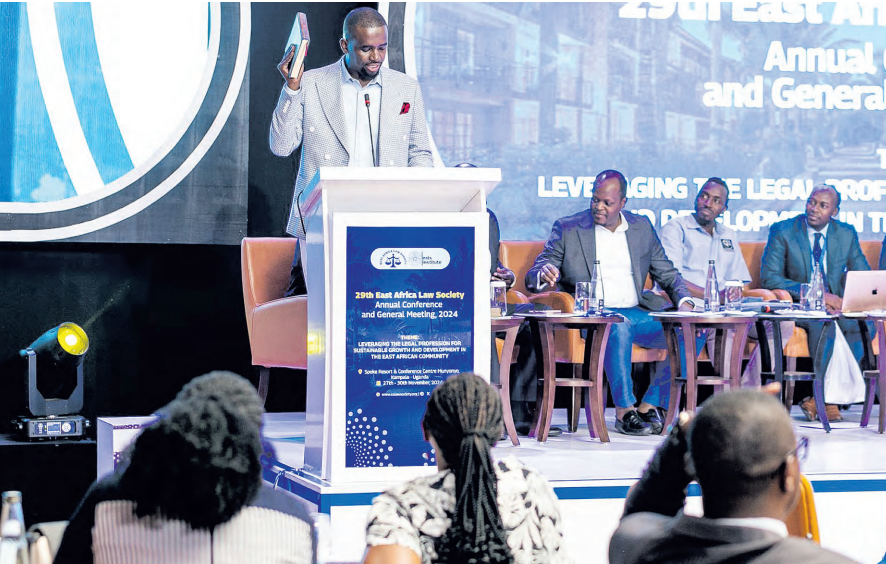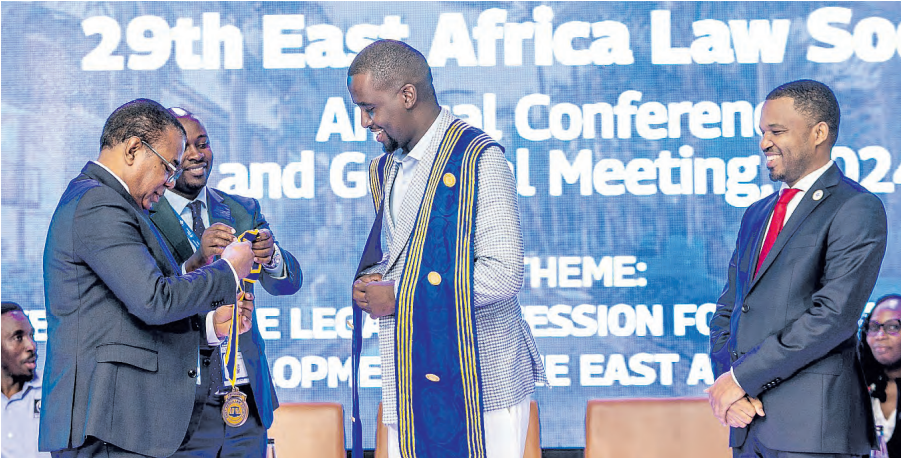

Unless you personally know Ramadhan Abubakar, you can barely pick him out from a crowd. Though always polished and with deep, enchanting voice, the 38-year-old lawyer comes across as harmless and unimposing.
This trait that has proven to be the most lethal and versatile tool in his arsenal when facing opponents in court or on the ballot, such as the recent election of the new president of East Africa Law Society.
Called to the bar in 2012, Abubakar cut his teeth as a pro bono advocate, mostly instructed by the Law Society of Kenya to take up cases of public interest, a habit that has yet to die off despite scaling the heights of practice.
Though largely off the glare of public attention, Abubakar handled some cases that have had huge repercussions. For example, he led the charge in an Embu court in 2018, resulting in a landmark decision that declared access to all medical P3 forms free. He was acting for LSK in the case.
In October this year, he was again at the forefront of legal battles, this time against the KDF over a parcel of land in Isiolo, where the military had given some 20,000 residents of Burat ward 30 days to vacate it.
The litigation started in 2019. Instructed again by LSK, Abubakar and team managed to get conservatory orders stopping the eviction.
Though the title of the land is held by the military, the court acknowledged that there were historical injustices meted out by the colonial government through the several pre-Independence gazette notices that allegedly gazetted the land as public land, depriving the local community.
“Public interest litigation is an area of practice that is highly addictive, and when you start, you just can never stop,” the newly elected regional bar boss says.
Abubakar has a knack for courage and trying things most would dismiss him from attempting. In 2018, he got elected by his lawyer colleagues as vice chair of the Mount Kenya chapter of LSK, where he served for four years unopposed.
From a remote chapter level, he decided to view for the East Africa Law Society vice presidency in 2022, and lady luck smiled on him.
He bagged the seat, serving for two years as the deputy to former Tanzanian High court judge Fauz Twalib. And during the 29th annual general meeting of the regional lobby, he ran against former LSK president Nelson Havi, a legal titan on his own right with formidable name recognition, and won, 273 to 139 votes.
The Star’s Gordon Osen interviewed him while he was still savouring the victory.
What are your priorities as you take up this role? Is cross-border practice among them, given the challenges Martha Karua is going through in trying to represent Kizza Besigye?
Of course, cross-border practice is a top issue for me. And cross-border challenges didn’t begin this year. It has been there since the birth of the EALS 29 years ago.
The idea was to have the integration in matters of equal practice. So for me, the idea is a focus, a general focus on this cross-border and how do we actuate it.
We’ve had a bill that was to be presented before the East African Legislative Assembly. Do we ignite it and see how to present it again? That is one of my ideas.
The second is having a look at legislation. All these EAC member countries have separate laws. My view is that, let’s look at the laws, see how we’re going to harmonise them to ensure there’s a seamless admission of East African advocates into their respective bars.
Another approach to this is reciprocity. Can we have a law society moving on the way of reciprocity, whereby if you admit me as a Kenyan, then you as a Rwandan, you get admitted?
In terms of the case of Martha Karua, senior counsel, is engaged in, I’ve had a conversation with some of the council members of the Uganda Law Society, and let me say this: For Kenya, you’ll find the law societies involved if you’re admitting someone from a different jurisdiction. But for Uganda Law Society, it’s totally different. The procedure is totally different.
You have to go through the law council. So the law society there is not involved in that particular process. But we as leaders of the bar in the region, we have undertaken to be involved and see how we can assist. So we are in communication.
Our secretariat is in communication with the legal team, and we do undertake to assist. If need be, I will also be appearing in that Besigye matter.
What weight does the East African Law Society carry in the advocacy of human rights and rule of law?
A huge, a huge obligation. And currently, as we speak, we have the rule of law index that we’ve done to measure all countries across the region in terms of their adherence to the rule of law.
And we shall be releasing it soon. So we want to assess all countries in terms of adherence to constitutionality, the treaty, rule of law.
And also, just to mention, we have a few cases pending before the East African Court of Justice. One of them is the Uganda Internet shutdown.
That’s a case we are still following up closely. We also have a case on the appointment of the judge at the EACJ, the Kenyan nominee to the EACJ.
Talking about the East Africa Court of Justice, most governments ignore its decisions, like the Ogiek case that was ignored by the Kenyan government. Does the court have teeth and what is the EALS doing about it?
It’s been a heavy challenge. In matters adherence or implementation of judgments from the regional courts, we as EALS are leading right now to see how we can ensure adherence to court orders. You mentioned the Ogiek case on the issue of issuance of titles and also the compensation that was awarded by the court.
For now, I’m not in contact with the legal team, but we were involved as a society. If need be, we are ready to file any content of the court against the necessary parties, be it any government that has been ordered to comply with a particular order.
For me, in terms of any order that is issued by the court, we must deal with it because otherwise, we won’t be able to honour it. Court orders must be obeyed no matter who you are.

You served as the number two at the society. Now that you are the boss, how will your regime be different?
Of course, we all have our different styles of leadership. But having served as the vice president of Dr Fauz Twaib, it was an honour because Dr Twaib is a man of experience and wisdom, being a former judge of the High Court of Tanzania.
I will try to emulate his style of leadership because he brought us all together, leaders from different jurisdictions. But of course, I will also have my own style.
We will be working with all the respective leaders from the region to make sure that EALS serves the interests of the membership.
Under your leadership, will EALS be more vocal in championing human rights and condemning things like abduction, which is now becoming cross-border in the region?
EALS has always been vocal. Let me say that. Perhaps it may not have been captured but we were involved in the Gen Z protest here in Kenya.
We issued a statement and even participated in the protests. When there was a fight between the executive and the judiciary, we were involved.
EALS will continue exercising its mandate. Even in the Besigye case, we will continue, and we do undertake to also be involved in any capacity to assist the legal team.
Success has many fathers, and entities like ODM party have made
claims that you are one of their own,
leading a committee there?
Yes. I was a member of the party and i have received information that I will now be appointed as the chair of the legal committee. So I’m just waiting for my salary. From your childhood days, how did the past prepare you for this moment?
I always wanted to be a lawyer. I remember when I was doing my Class 8, I knew I wanted to go to a national school. That was the 2000s.
There were very few, about eight national schools around the country. If you don’t get to any of those, for me, I would consider it to be a failure.
I applied for Maseno School and while there studying, watching people like Senior Counsels James Orengo, Gitobu Imanyara, Martha Karua, Gibson Kuria and others on TV left me in awe of the profession.
What other issue is topping your EALS priority list?
We were granted 10 acres by president Samiah Suluhu in Arusha, where we intend to construct our headquarters and an EALS institute to serve the membership.
And also, perhaps my vision and ambition is to construct a boutique hotel that, when the membership perhaps gets to travel to the EACJ, the African Court of Human Rights, which are all based in Arusha, you get to spend some time in a boutique hotel for free. So now my focus is now getting to funding for this particular construction.
Yes, another thing we achieved is now the inclusion of Ethiopia and DRC as part of the members of EALS. Our constitution announced that we will commit to open membership. Other members or regional powers in the region that want to join, we are open.
At some point when done with the
current assignment, will you come
back and try to lead LSK?
No. For now, that’s not a thought. For, now, it’s a great honour to serve. As president of the EASL, I also get to serve the local bar because president Faith Odhiambo sits in my council.
Any future in politics?
Everybody has been asking that
question. For now, my focus is on
EALS. But I can safely say that in future, if the people ask me and support me, I’m equal to the challenge.











